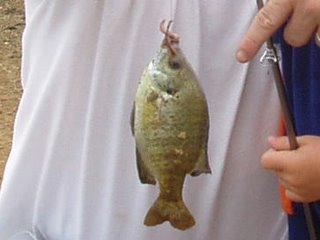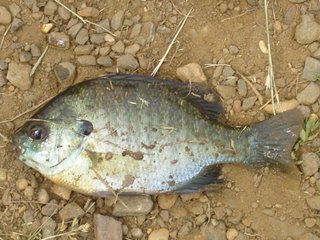So I am proud to present the North American Sunfish, staunch defender of the peoples of the United States in a time of war:
A type of fish so common that practically every American kid who ever dropped a fishing line and a bobber into a pond has probably caught one is being enlisted in the fight against terrorism.
San Francisco, New York, Washington and other big cities are using bluegills also known as sunfish or bream as a sort of canary in a coal mine to safeguard their drinking water.

Small numbers of the fish are kept in tanks constantly replenished with water from the municipal supply, and sensors in each tank work around the clock to register changes in the breathing, heartbeat and swimming patterns of the bluegills that occur in the presence of toxins.
"Nature's given us pretty much the most powerful and reliable early warning center out there," said Bill Lawler, co-founder of Intelligent Automation Corporation, a Southern California company that makes and sells the bluegill monitoring system. "There's no known manmade sensor that can do the same job as the bluegill."
Bluegills a hardy species about the size of a human hand are considered more versatile. They are highly attuned to chemical disturbances in their environment, and when exposed to toxins, they experience the fish version of coughing, flexing their gills to expel unwanted particles.
The computerized system in use in San Francisco and elsewhere is designed to detect even slight changes in the bluegills' vital signs and send an e-mail alert when something is wrong.

San Francisco's bluegills went to work about a month ago, guarding the drinking water of more than 1 million people from substances such as cyanide, diesel fuel, mercury and pesticides. Eight bluegills swim in a tank deep in the basement of a water treatment plant south of the city.
New York City has been testing its system since 2002 and is seeking to expand it. The New York City Department of Environmental Protection reported at least one instance in which the system caught a toxin before it made it into the water supply: The fish noticed a diesel spill two hours earlier than any of the agency's other detection devices.
The Daily News has this:
The sensitive fish can amazingly detect a host of hazards - even from divers kicking up dirt in the water from as far away as 50 miles...
..."Nothing touches the fish. There are sensors in the aquarium," said Lawler. The sensors measure the electrical signals given off by the fish, and those signals are amplified 10,000 times by a computer software program.
 All hail the mighty sunfish! (this one, hardy as his reputation, survived slipping off the hook and going MIA in the weeds and rocks for a time...he swam away happily; only to be caught again on the same worm a short time later...)
All hail the mighty sunfish! (this one, hardy as his reputation, survived slipping off the hook and going MIA in the weeds and rocks for a time...he swam away happily; only to be caught again on the same worm a short time later...)
No comments:
Post a Comment